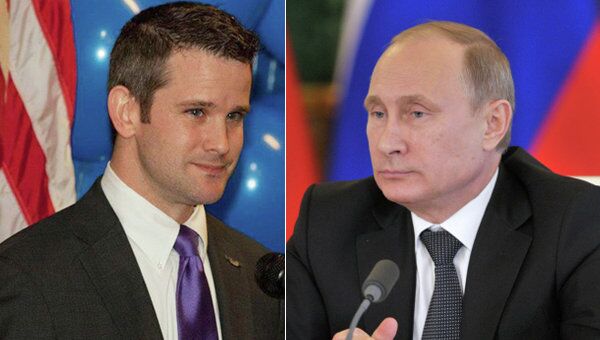WASHINGTON, October 29 (By Maria Young for RIA Novosti) – A US lawmaker on Tuesday accused Russian President Vladimir Putin of “severe discrimination and persecution” of Meskhetian Turks, an ethnic minority population that claims it has long suffered harassment in southern Russia.
“They are severely persecuted by top Russian authorities in Putin's government solely for their ethnicity and religion,” said US Rep. Adam Kinzinger of Illinois, who has a large number of Turkish immigrants in his congressional district, in a speech on the floor of the US House of Representatives.
The comments come as activists in the United States sharply step up their efforts to launch a new, expanded resettlement program for Meskhetian Turks, also known as Ahiska Turks, similar to a US State Department program that brought an estimated 11,000 refugees from the Krasnodar region in southern Russia to the United States from 2004 to 2007.
“The situation now is in really, really bad shape,” said Islom Shakhbandarov, president of the Ahiska Turkish American Community Center (ATACC) of Dayton, Ohio, home to thousands of Turkish immigrants.
He and other Turkish activists are meeting with Kinzinger and more than a dozen other members of Congress and human rights organizations in Washington this week in order to raise awareness and drum up support for a new resettlement program.
“There are at least 80,000 of these people still remaining in Russia, and most of them, if the US is willing to restart the program, most of them will come to the US, so we are doing everything possible, every single effort we can do to make this happen,” Shakhbandarov told RIA Novosti.
Senior Russian officials routinely note that the country is a multi-ethnic and multi-confessional state in which the rights of all citizens are respected and defended.
Putin and his government have also said in the past that Meskhetian Turks should be allowed to return to their traditional homeland in the former Soviet republic of Georgia, but officials there have been criticized for being reluctant to allow this resettlement.
Historically, Meskhetian Turks lived along the between Georgia and Turkey.
They were deported in mass numbers in 1944 by Soviet dictator Joseph Stalin to what is now Uzbekistan. Many fled persecution there in 1989 and settled in Krasnodar and the surrounding regions, where they claim to face ongoing abuses.
The recent claims of discrimination include brutal attacks and threats of violence, as well as a lack of access to jobs, housing, protection, health care, places of worship and education.
A report released this month by the European Commission on Racism and Intolerance (ECRI), the Council of Europe’s independent human rights monitoring body, described the situation for ethnic minorities in the Krasnodar region as “very bad.”
The ECRI also said efforts to monitor discrimination “have been met with hostility by the authorities, including criminal investigations and prosecutions, as well as aggression on the part of right-wing organizations.”
“This is the reality of Putin's Russia: in Russia people are routinely and severely discriminated against, tortured, and even killed, and are economically and financially repressed,” Kinzinger said in his speech Tuesday.
Meskhetian Turks who have resettled in the United States, Kinzinger added, “are now truly living the American dream.”
“This is a personal mission for me, because I cannot tolerate the discrimination and unfairness these people experience,” Shakhbandarov said. “It happens every, every day and we must help them.”


